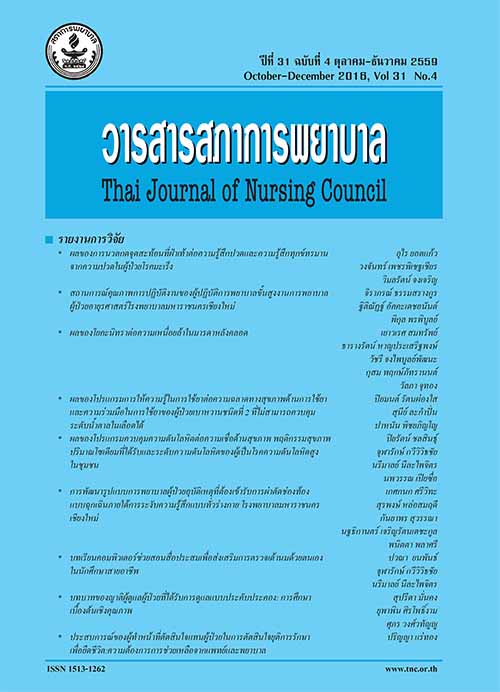บทบาทของญาติผู้ดูแลผู้ป่วยที่ได้รับการดูแลแบบประคับประคอง: การศึกษาเบื้องต้นเชิงคุณภาพ; Roles of Family Caregivers of Palliative Care Patients: Preliminary Qualitative Study
Keywords:
ญาติผู้ดูแล, บทบาท, ผู้ป่วยระยะประคับประคอง, การดูแลระยะประคับประคอง, family caregivers, roles, palliative care patients, palliative careAbstract
บทคัดย่อ: วัตถุประสงค์ของการวิจัย: เพื่อศึกษาบทบาทของญาติผู้ดูแลในการดูแลผู้ป่วยที่ได้รับการดูแลแบบประคับประคองในสถานบริการต่าง ๆ
การออกแบบงานวิจัย: กำรวิจัยเชิงคุณภาพ
วิธีการดำเนินการวิจัย: กลุ่มตัวอย่าง ประกอบด้วย ญาติผู้ดูแลผู้ป่วยที่ให้การดูแลผู้ป่วยในระยะประคับประคองจำนวน 28 ราย คุณสมบัติของกลุ่มตัวอย่าง ได้แก่ เป็นญาติ
ผู้ดูแลผู้ป่วยที่ได้รับการดูแลแบบประคับประคองในสถานบริกำรที่มีการดูแลเฉพาะ การดูแลต่อเนื่องที่บ้าน และองค์กรทางศาสนา เครื่องมือที่ใช้ในการเก็บรวบรวมข้อมูล ประกอบด้วย
แบบบันทึกข้อมูลส่วนบุคคลแบบสัมภาษณ์ญาติผู้ดูแลรายกลุ่มและรายบุคคล วิเคราะห์ข้อมูลด้วยสถิติพรรณนา และการวิเคราะห์เนื้อหา
ผลการวิจัย: ญาติผู้ดูแลผู้ป่วยที่ได้รับการดูแลแบบประคับประคองส่วนใหญ่เป็นโรคมะเร็ง มีบทบาทดังนี้ 1) ผู้ให้การดูแลเพื่อตอบสนองความต้องการการดูแลของผู้ป่วย
2) ผู้ประสานงานการจัดการการดูแลในครอบครัว และ 3) ผู้ตัดสินใจเตรียมพร้อมสำหรับความตาย
ข้อเสนอแนะ: สถำนบริการที่ให้การดูแลผู้ป่วยระยะประคับประคอง เป็นแหล่งสนับสนุน
ทางสังคมที่สำคัญสำหรับผู้ป่วยระยะประคับประคองและญาติผู้ดูแล กำรเข้าใจบทบาทของ
ญาติผู้ดูแลผู้ป่วยในแต่ละสถานบริการ เป็นแนวทางในการช่วยเหลือและตอบสนองความต้องการ
ของญาติผู้ดูแลที่ให้การดูแลผู้ป่วยระยะประคับประคอง
Abstract: Objective: To study the roles of family caregivers of patients who were receiving
palliative care in healthcare service stations.
Design: Qualitative research.
Implementation: The sample consisted of 28 family caregivers of palliative care
patients. The participating caregivers’ qualifcations included (a) being relatives of the
patients under palliative care in healthcare service stations with specialised palliative
care units; (b) offering long-term care at the patients’ homes; and/or (c) being religious
organisations. The instruments for data collection were (1) a personal information
questionnaire and (2) individual and group interview forms to interview the caregivers.
Descriptive statistics and content analysis were used to analysed the data.
Results: The majority of the palliative care recipients were cancer patients. The
primary roles of their family caregivers are (1) caring for and responding to the patients’
needs; (2) coordinating the management of the patients’ family affairs; and (3) making
decisions in preparation for the patients’ deaths.
Recommendations: Healthcare service stations giving palliative care service are
an important source of social support for palliative care recipients and their family
caregivers. It is crucial that each station’s personnel understand the roles of the palliative
care recipients’ caregivers and respond to both the recipients’ and their caregivers’
needs.






